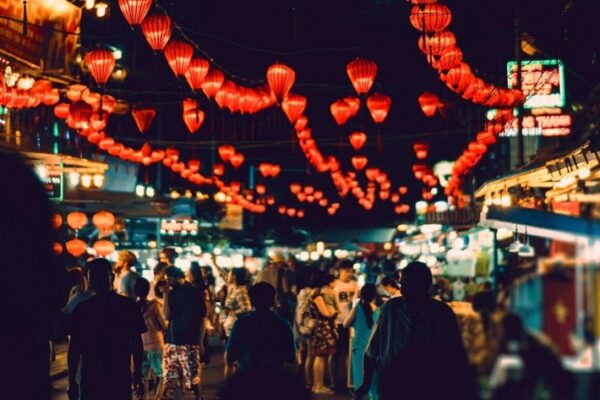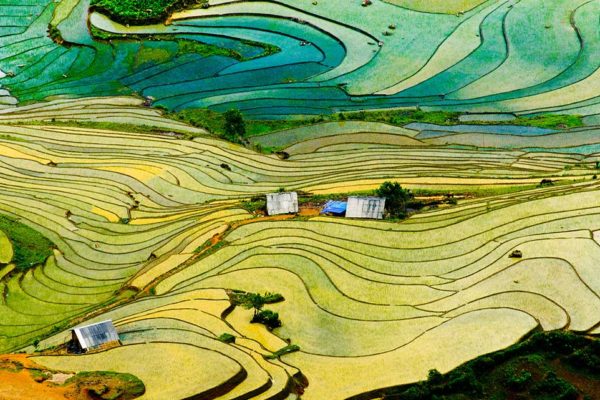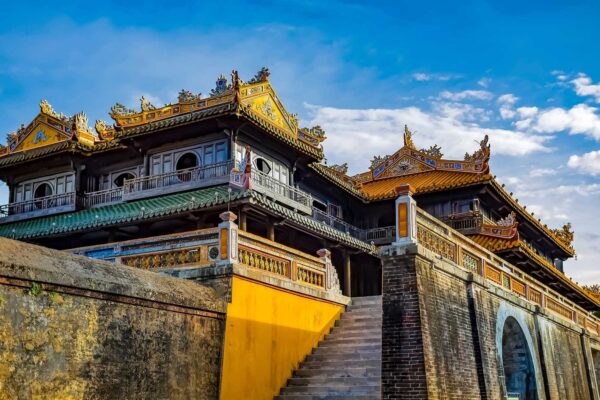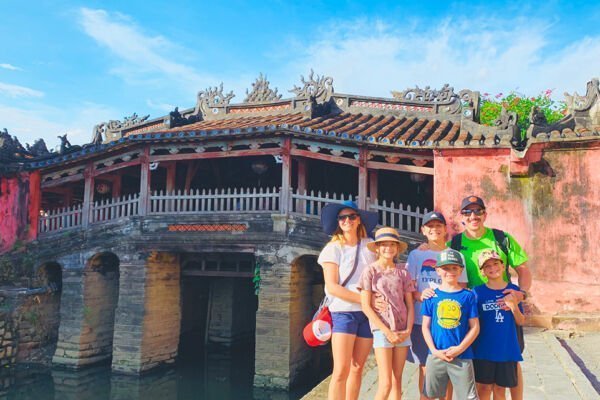Cultural Things To Do in Phu Quoc: Temples, Pagodas & Museums
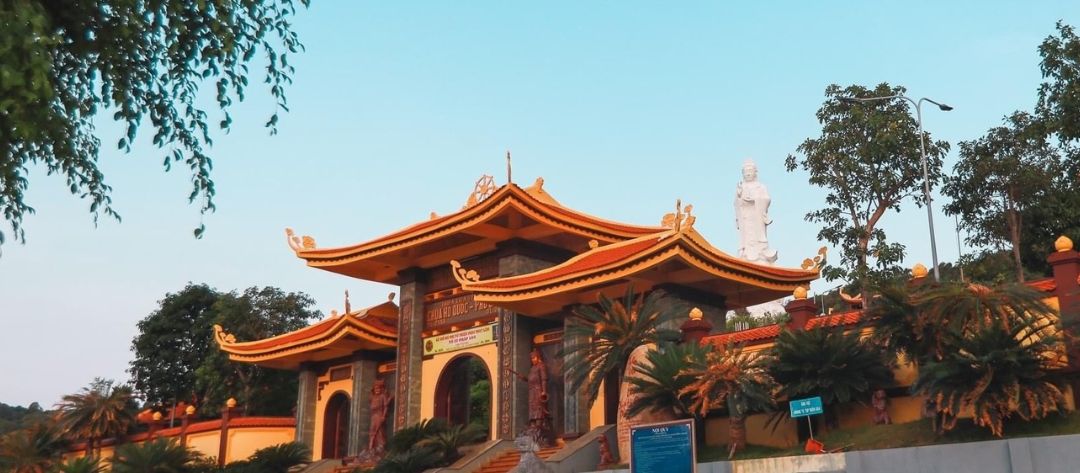
Phu Quoc offers more than sun-kissed beaches and luxury resorts—it is also a vibrant cultural destination waiting to be explored. From centuries-old temples to poignant museums and traditional village life, the island presents countless opportunities for travelers to engage with its spiritual, historical, and artistic heritage.
If you’re looking to go beyond the typical itinerary, this guide to cultural things to do in Phu Quoc will help you connect with local traditions, admire regional architecture, and better understand the soul of the island.
Why You Should Explore Cultural Attractions in Phu Quoc
A profound journey into the island’s rich heritage, spirituality, and traditions is what you can expect when discovering the cultural attractions of Phu Quoc. Beyond its pristine beaches, Phu Quoc boasts a tapestry of historical sites, sacred temples, and vibrant local customs that reflect centuries of cultural evolution and resilience.
Understand the Island’s Historical Evolution
Phu Quoc’s past is shaped by diverse influences—Khmer roots, Chinese merchant traditions, and Vietnamese heritage. From colonial remnants to wartime relics like the Phu Quoc Prison, each site holds stories that reveal how the island has grown through conflict and cultural integration.
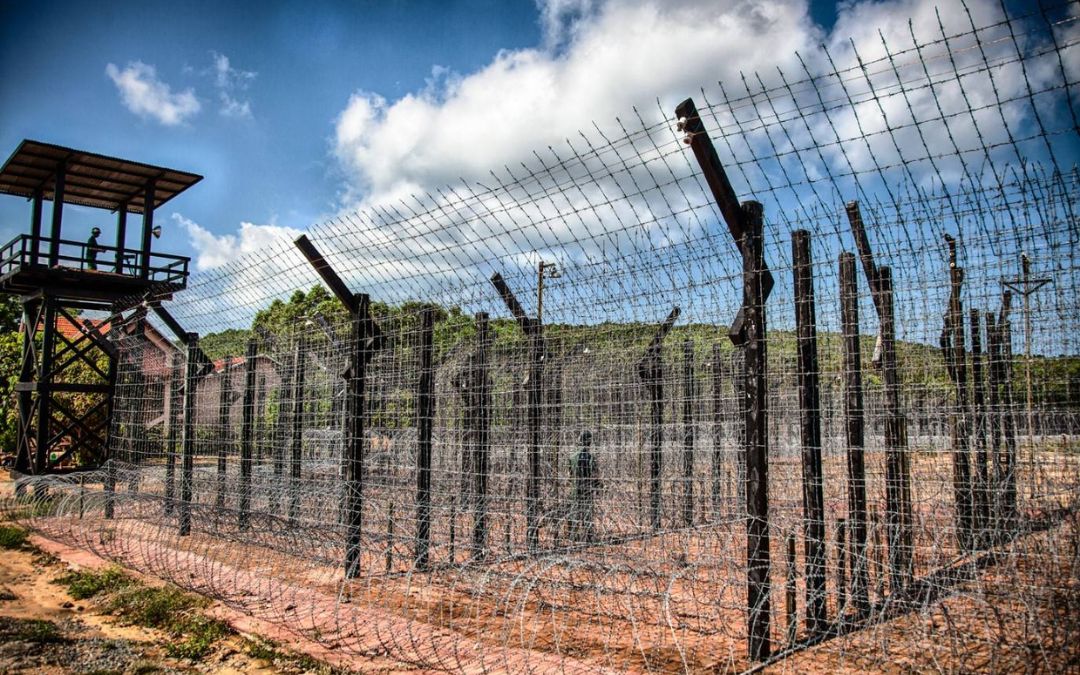
The prison stands as a solemn reminder of Vietnam’s resilience.
Experience Authentic Vietnamese Spirituality
Temples and pagodas scattered across the island offer an intimate glimpse into the spiritual life of local communities. Incense-filled halls, dragon-adorned gates, and serene Buddha statues reflect deep-rooted beliefs and everyday rituals of island residents—making them a meaningful part of what to do in Phu Quoc beyond the beaches.
Appreciate Traditional Architecture and Art
Many religious sites and ancestral homes on Phu Quoc showcase classic Vietnamese craftsmanship—wood carvings, curved tile roofs, and symbolic motifs. These structures are not just beautiful—they are living expressions of regional art and identity.
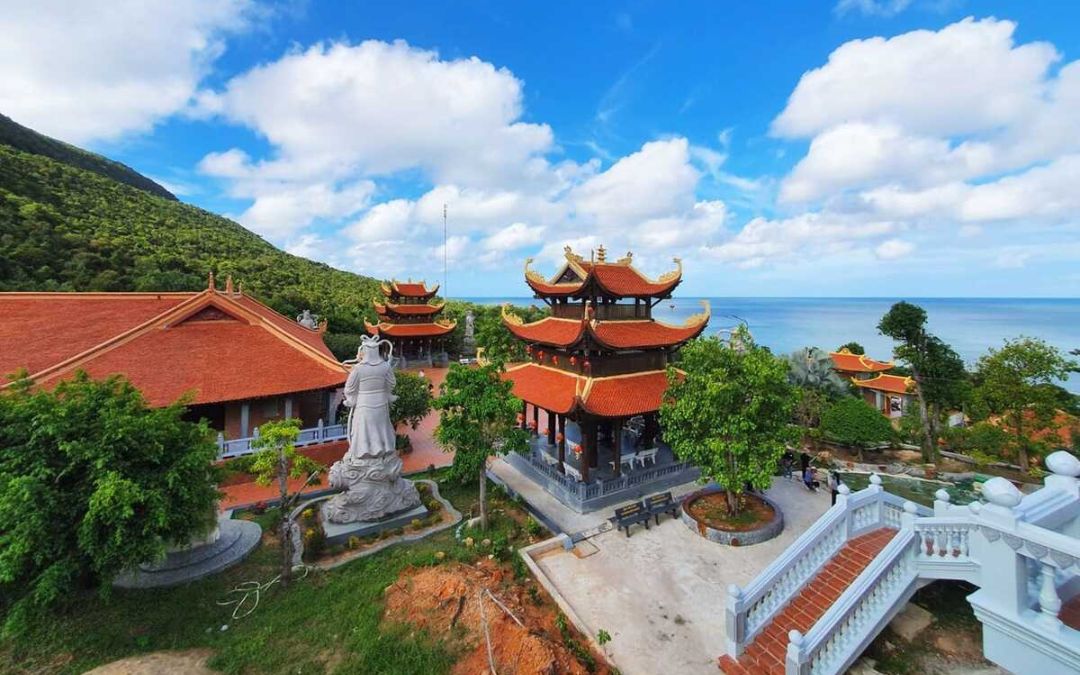
Phu Quoc’s pagodas reflect stunning traditional Vietnamese architecture.
Connect with Local Customs and Traditions
Whether it’s observing fishermen at a coastal village shrine or participating in a Tet festival, cultural encounters on Phu Quoc bring you closer to its people. These experiences provide rare opportunities to engage with local traditions that have endured for generations.
Temples and Pagodas in Phu Quoc: Spiritual Anchors of the Island
Spiritual heritage through centuries-old temples and pagodas in Phu Quoc are sacred sites that not only reflect local religious life but also preserve traditional architecture and island legends. Let’s dive into the top temples and pagodas that will enrich your cultural journey across Phu Quoc.
Ho Quoc Pagoda (Truc Lam Ho Quoc Monastery)
- Location: Suoi Lon Hamlet, Duong To Commune, Phu Quoc City
Ho Quoc Pagoda is one of the most majestic spiritual sites in Phu Quoc, perched high on a coastal hill that opens out to sweeping views of the sea. Built in the early 2010s, this modern yet traditionally designed Buddhist monastery follows the Ly–Tran Dynasty architectural style, featuring red-tiled roofs, stone dragon carvings, and towering statues of the Buddha.
The peaceful ambiance makes it a popular spot for both morning meditation and sunrise viewing. Visitors often stop here not only for spiritual reflection but also for a quiet escape amid nature’s beauty and tranquility.
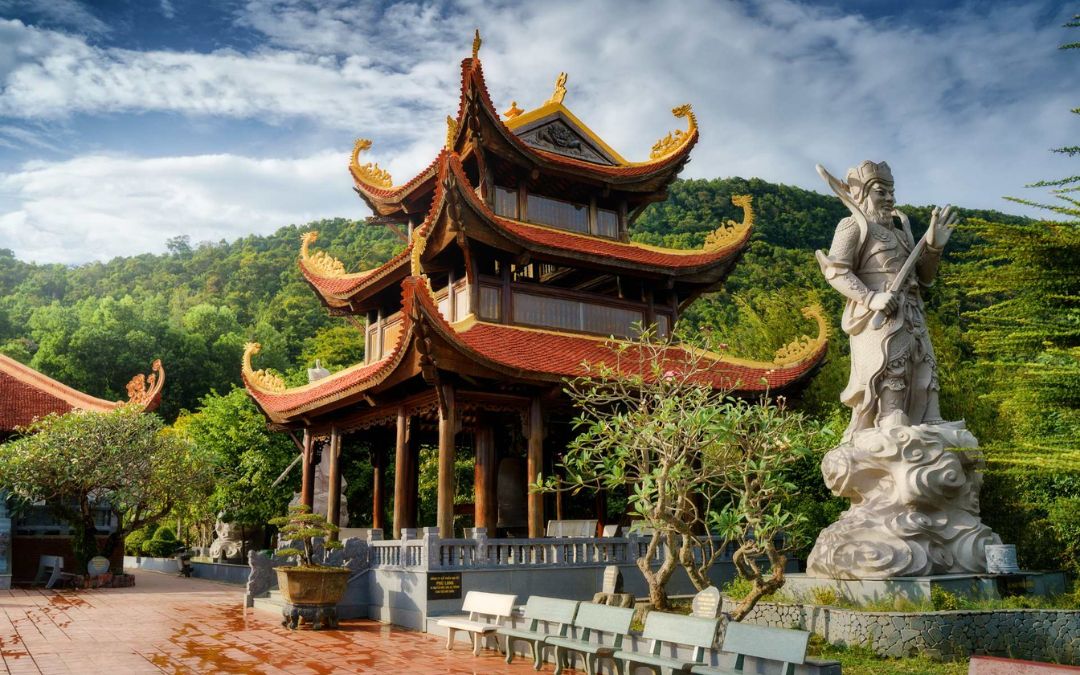
Ho Quoc Pagoda offers stunning sea views and a serene spiritual atmosphere.
Dinh Cau Temple (Cau Temple)
- Location: Bach Dang Street, Duong Dong Town, Phu Quoc City
Dinh Cau Temple is an iconic spiritual and cultural symbol of Phu Quoc, dramatically built on a rocky promontory where the river meets the sea. The temple is small but sacred, especially among local fishermen who come here to pray for calm seas and good fortune.
A narrow stone staircase leads up to the temple, offering a panoramic view of the ocean—especially stunning at sunset. Combining spiritual significance with photogenic charm, Dinh Cau is a must-visit for those seeking both faith and scenic beauty in one stop.
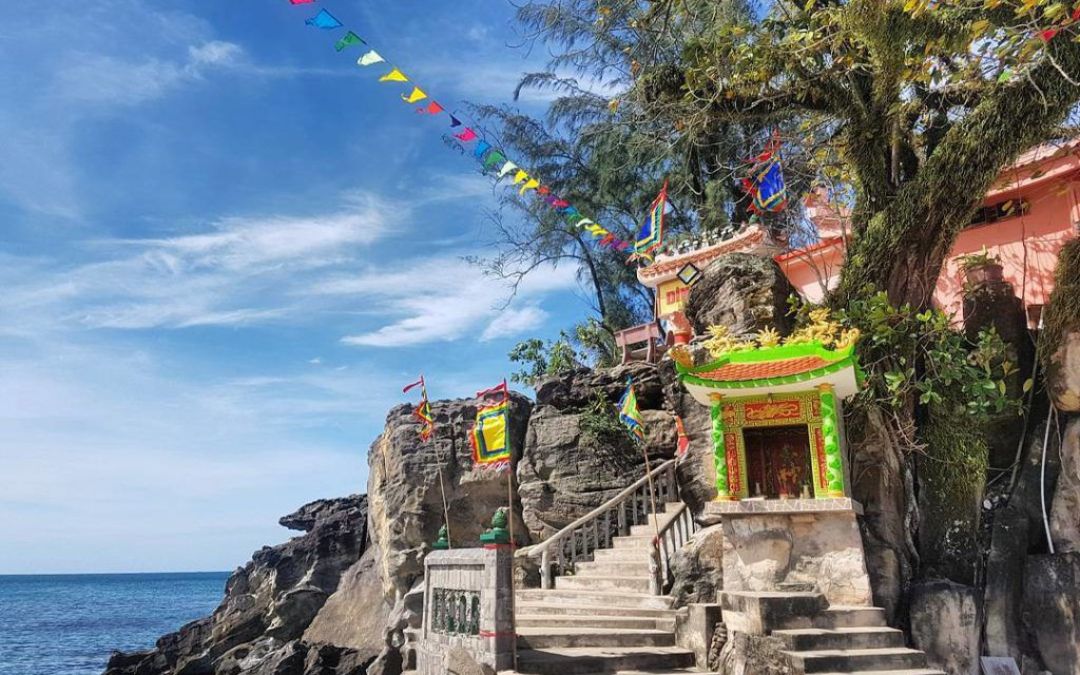
Dinh Cau Temple sits atop a rocky hill, overlooking the sea.
Sung Hung Pagoda
- Location: No. 7, Tran Hung Dao Street, Duong Dong Town, Phu Quoc City
As the oldest pagoda on the island, Sung Hung Pagoda holds a unique place in the heart of local worshippers. Tucked away amidst lush trees in the center of Duong Dong, it features traditional wooden architecture, intricate altars, and statues of Amitabha Buddha and other deities.
The temple complex is quiet and atmospheric, ideal for those looking to observe local religious practices or simply find a serene moment during their trip. It’s also a testament to how Phu Quoc preserves its spiritual heritage despite rapid tourism development.
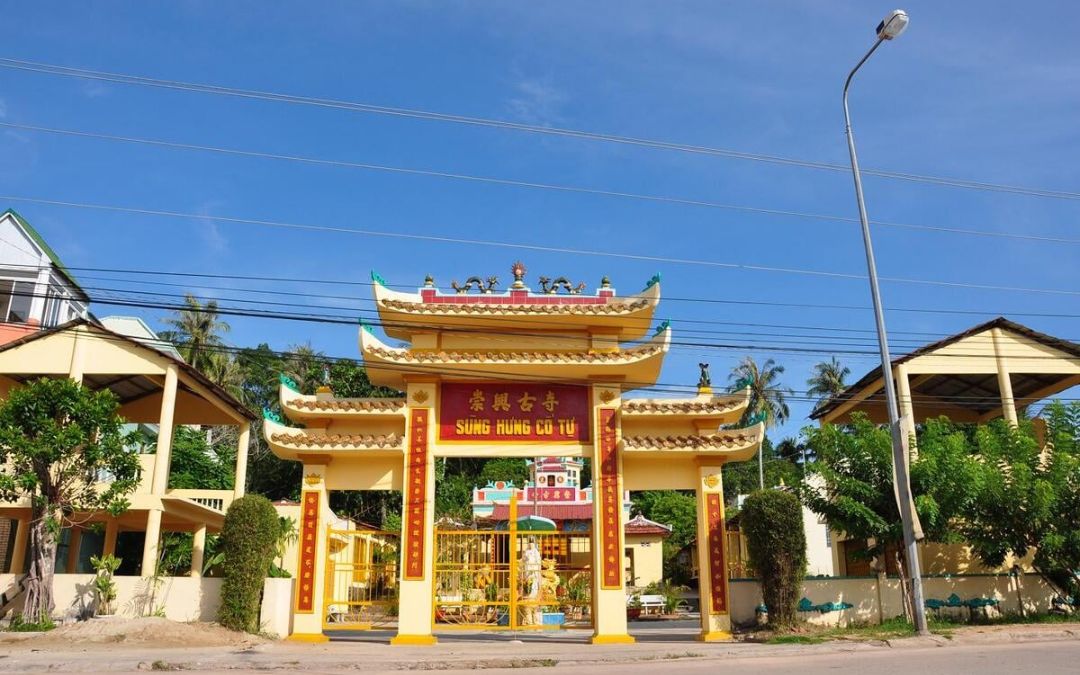
Sung Hung Pagoda is one of Phu Quoc’s oldest Buddhist temples.
Su Muon Pagoda (Hung Long Tu)
- Location: Suoi Da Hamlet, Duong To Commune, Phu Quoc City
Nestled against a hill and surrounded by tropical greenery, Su Muon Pagoda offers visitors a peaceful, almost hidden sanctuary. The path to the temple involves a short uphill walk through a lush garden of bodhi trees and stone steps, setting the tone for a reflective visit.
Built over 80 years ago, this pagoda is not only a place of prayer but also a spiritual refuge where locals come to make offerings and meditate. The quiet surroundings and traditional elements make it a perfect spot for travelers interested in the more contemplative side of Phu Quoc’s spiritual life.

Locals visit Su Muon Pagoda for prayers and meditation.
Nguyen Trung Truc Temple
- Location: Ganh Dau Commune, Phu Quoc City
This temple is dedicated to Nguyen Trung Truc, a national hero known for his resistance against French colonial rule in southern Vietnam. Nestled in the quiet commune of Ganh Dau, the temple is more than a religious site—it’s a place of patriotic remembrance. The architecture is humble but dignified, with red-tiled roofs and traditional wooden details.
Exploring Nguyen Trung Truc Temple is one of the most meaningful cultural things to do in Phu Quoc, especially for those interested in Vietnamese history. Visitors come here to learn about the hero’s legacy, pay their respects, and reflect on the island’s role in the country’s fight against colonialism.
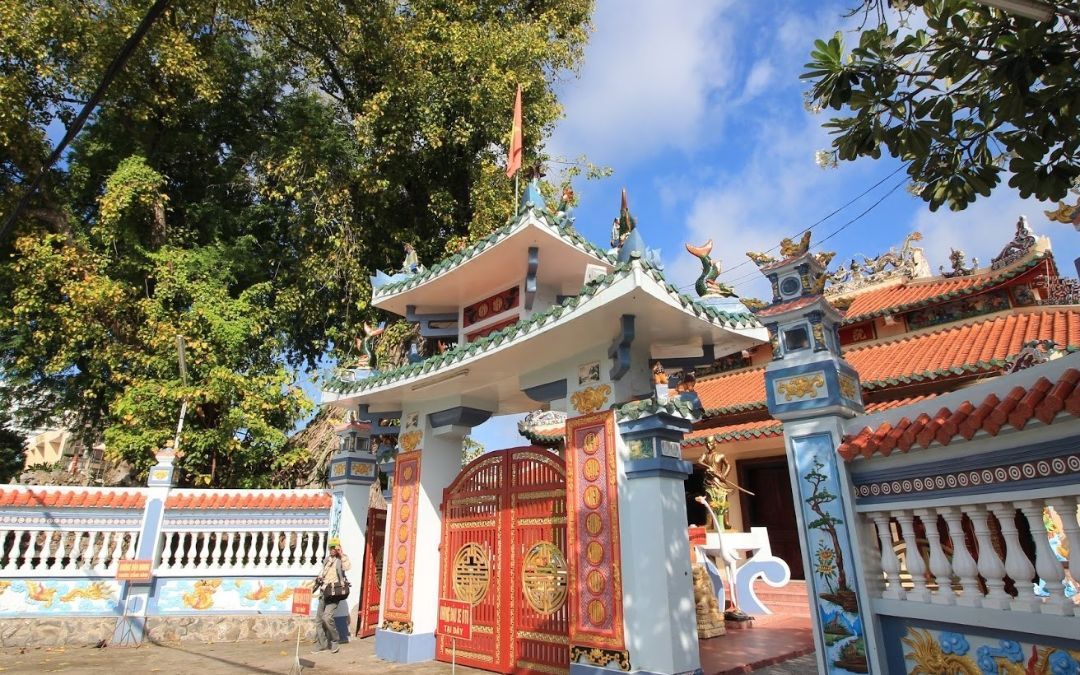
Nguyen Trung Truc Temple honors a national hero’s legacy.
Dinh Ba Thuy Long Thanh Mau Temple
- Location: Duong Dong Town, Phu Quoc City
This temple is deeply rooted in island folklore and is dedicated to Thuy Long Thanh Mau, the sea goddess believed to protect fishermen and bless coastal communities. Located just a short walk from Dinh Cau Temple, it complements the spiritual network of the island.
Visitors are often intrigued by its vibrant exterior, local offerings of fruit and incense, and the communal rituals held during festivals. The temple is also closely tied to the spiritual life of women in the fishing village, offering a unique perspective on gender and belief in Vietnamese coastal culture.
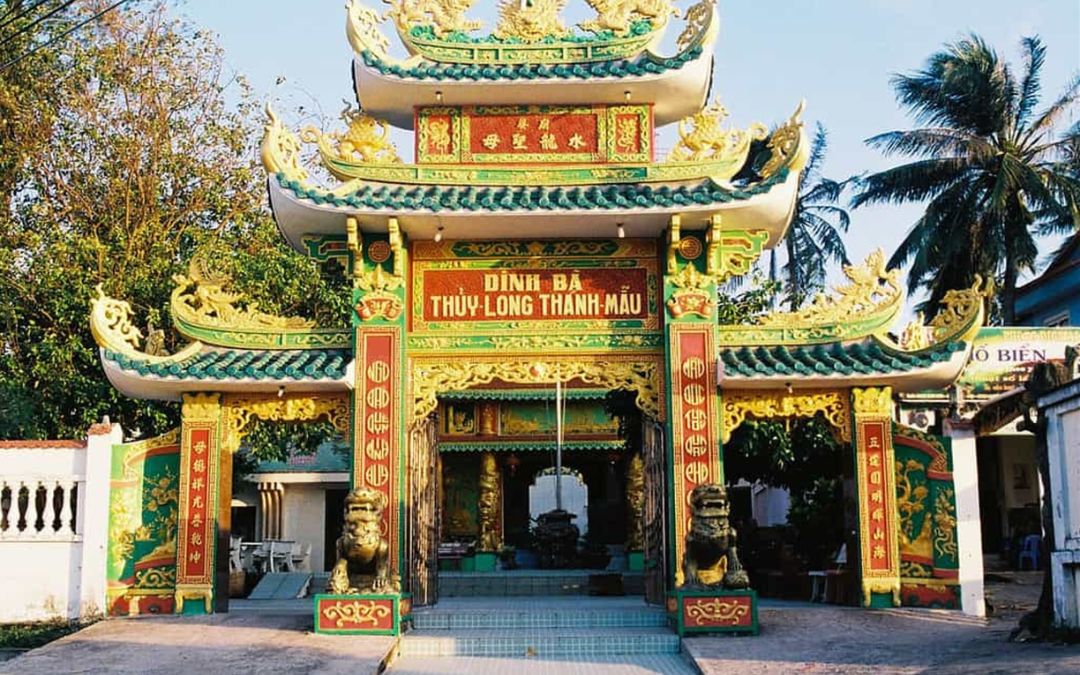
Travelers experience local spiritual traditions at Dinh Ba Temple.
Hung Quoc Tu Pagoda (Phuoc Thien Pagoda)
- Location: Nguyen Trung Truc Street, Duong Dong Town, Phu Quoc City
Founded in 1952, Hung Quoc Tu Pagoda is a vivid example of southern Vietnamese Buddhist architecture. With its ornate gate, colorful reliefs, and peaceful courtyard, the temple invites visitors into a calm and contemplative space.
It is actively used by locals for daily worship, and monks here are known to be welcoming to travelers interested in learning about Buddhism. The pagoda’s position in town makes it easily accessible, and while it may not be as large as Ho Quoc, it offers a more intimate spiritual experience.
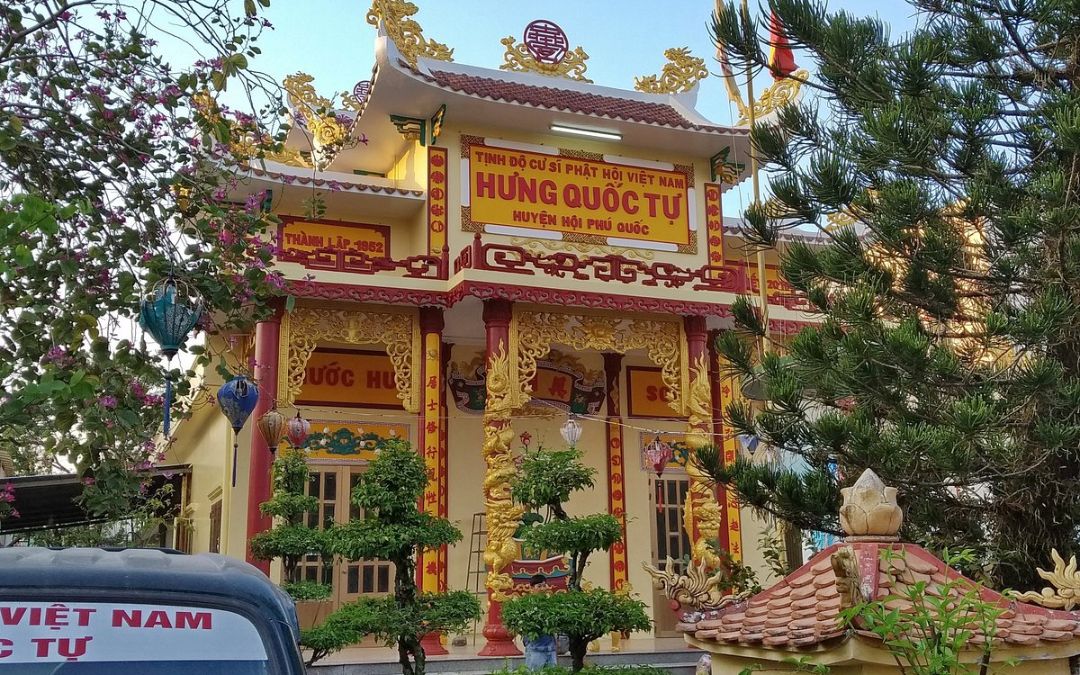
The pagoda offers a serene escape from Phu Quoc’s bustling streets.
Cao Dai Temple
- Location: Duong Dong Town, Phu Quoc City
Cao Dai Temple in Phu Quoc reflects the eclectic and unique Caodaism faith—a Vietnamese-origin religion that blends elements of Buddhism, Taoism, Confucianism, Christianity, and Islam. With its colorful facade and symbolic decor, the temple is instantly eye-catching.
Visitors are drawn not just by its architecture but also by the deeper message of spiritual unity and harmony that the Cao Dai faith promotes. Attending a short midday prayer session (if allowed) offers a fascinating window into one of Vietnam’s most distinctive religious movements.
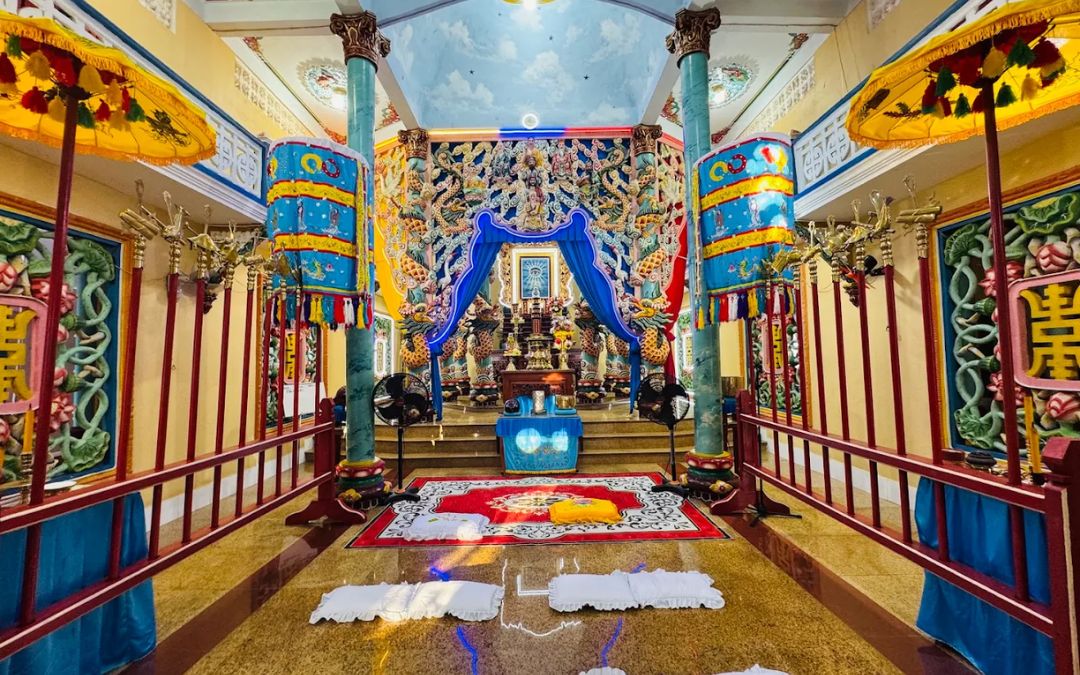
The temple features vibrant murals and symbolic architecture.
>> See Tour: Splendours of Vietnam Beach Tour
Top Museums in Phu Quoc to Discover Island History and Culture
Beyond its postcard-perfect shores, Phu Quoc offers travelers a richer layer of discovery through its museums, giving you a chance to uncover the island’s storied past, witness its resilience, and understand the traditions that continue to shape local life today.
Coi Nguon Museum
- Location: 149 Tran Hung Dao Street, Duong Dong Town, Phu Quoc City
Founded in 2009, Coi Nguon Museum provides a fascinating look into the natural and cultural heritage of the island. This privately operated museum features more than 3,000 artifacts, from ancient pottery and fishing tools to fossilized wood and rare documents.
Spread across five levels, the exhibitions cover everything from Phu Quoc’s early inhabitants to its marine life and traditional crafts. There’s also a rooftop café and a souvenir shop on-site, making it a comfortable and educational stop. If you’re deciding what to do in Phu Quoc beyond beaches, this museum is a great place to start.
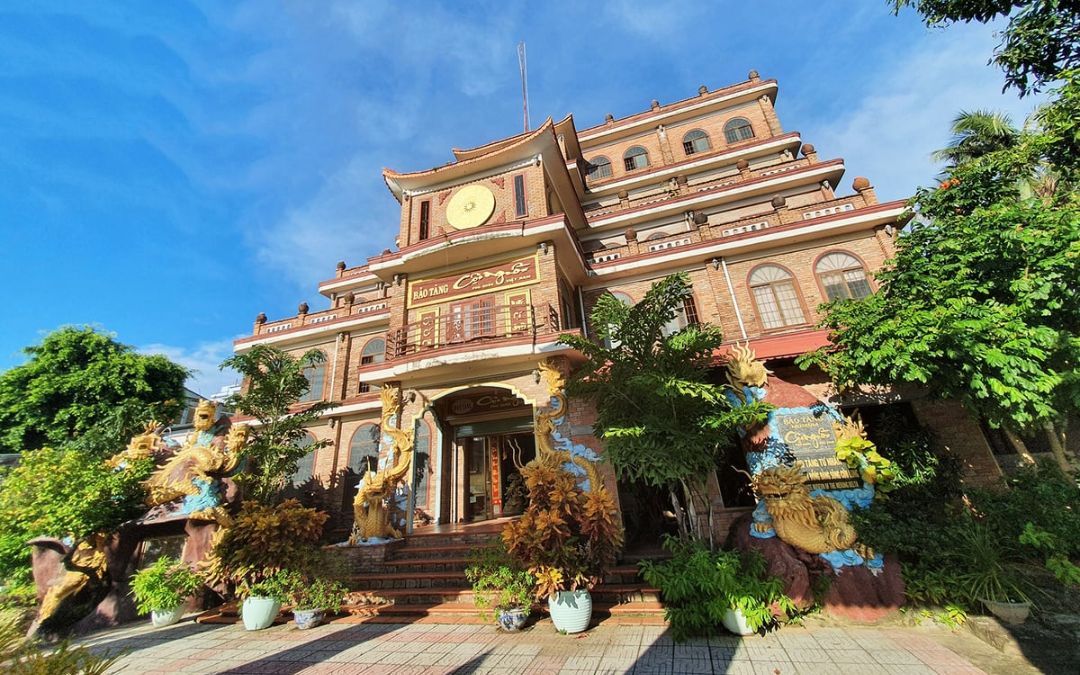
The museum offers insights into Phu Quoc’s traditions and evolution.
Tips:
- Set aside 1–2 hours for a complete visit.
- Photography is permitted, but avoid using flash.
- A local guide can provide rich context and stories behind the displays.
Phu Quoc Prison (Coconut Tree Prison)
- Location: 350 Nguyen Van Cu Street, An Thoi Ward, Phu Quoc City
Phu Quoc Prison, also known as Coconut Tree Prison, is a solemn yet essential stop for anyone seeking to understand Vietnam’s complex history. Built during French colonial rule and later used during the Vietnam War, the prison once held over 30,000 political prisoners.
Today, it functions as a museum that reconstructs life inside with chilling accuracy—through preserved cells, barbed-wire cages, and realistic mannequins depicting torture methods. Walking through the site is a moving experience, one that reveals the deep scars of conflict and the strength of those who endured it.
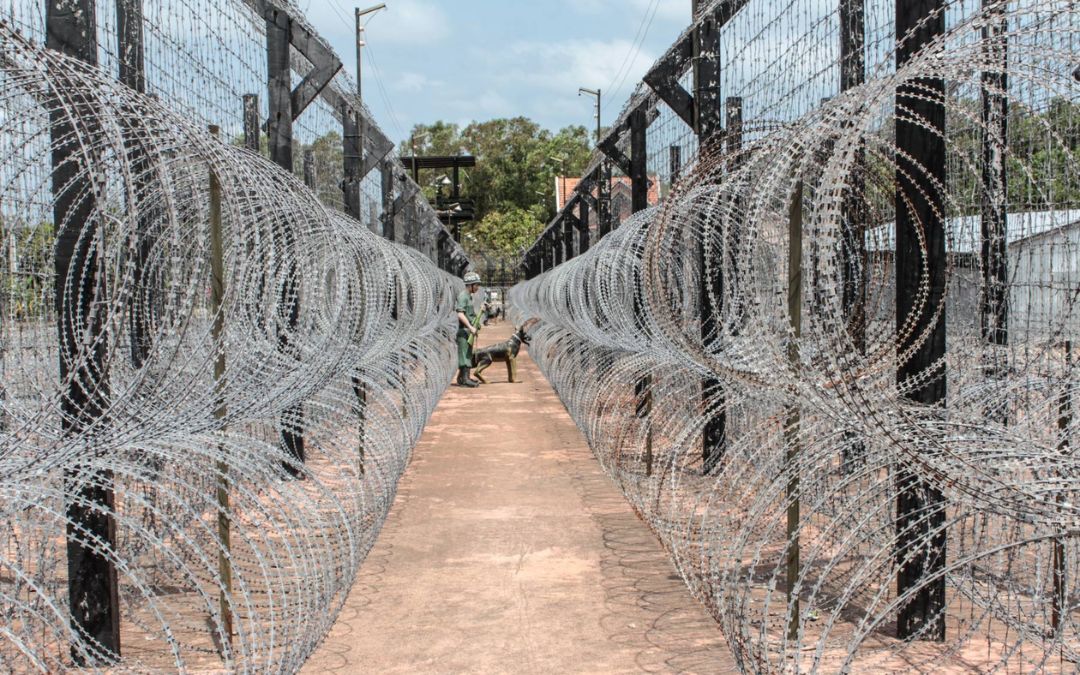
The prison honors those who endured hardships during conflicts.
Tips:
- Dress respectfully, as this is a historical memorial site.
- Some exhibits may be emotionally intense; be prepared.
- Guided tours are available and recommended for historical context.
>> Read More: The Ultimate Phu Quoc Travel Guide
Best Practices for Visiting Cultural Sites in Phu Quoc
To fully enjoy the most meaningful cultural things to do in Phu Quoc, it’s essential to approach temples, museums, and heritage sites with mindfulness and respect. These sites are not only tourist attractions but also living spaces of faith, memory, and identity for locals. Below are some best practices to help ensure a respectful and enriching visit:
1. Dress Modestly
Visitors are encouraged to wear clothing that covers their shoulders and knees, especially when entering pagodas and temples.
2. Remove Your Shoes
Always take off your shoes before entering sacred temple halls or prayer areas. This act shows reverence and is a common practice in Vietnamese Buddhist and spiritual customs.
3. Maintain Silence and Respectful Behavior
Temples and museums are places of contemplation. Avoid loud talking or disruptive behavior. Even outside major ceremonies, locals often come to pray, so it’s important to preserve a peaceful atmosphere.
4. Avoid Flash Photography
Using flash can damage murals, relics, and the sacred atmosphere of worship spaces. Look for signs that indicate photography rules and ask staff or monks when in doubt.
5. Offer a Donation When Possible
Even a small donation (10,000 – 20,000 VND) can contribute to the maintenance and preservation of these cultural landmarks. Many temples rely partly on visitor offerings for upkeep and renovation.
6. Hire a Local Guide
Engaging a local guide is not only a great way to support the local economy but also allows you to gain deeper insights into Phu Quoc’s culture, legends, and historical narratives.
7. Visit During Local Festivals
To see cultural sites at their most vibrant, time your visit with key festivals like the Nguyen Trung Truc Memorial Day or Tet. These events bring communities together in celebration with processions, food, music, and rituals that highlight Phu Quoc’s spiritual richness.
>> Read More: Phu Quoc Weather Guide – The Best Time to Visit for a Perfect Trip
Plan Your Trip Around These Cultural Things To Do in Phu Quoc
If you’re wondering whether cultural things to do in Phu Quoc are worth adding to your itinerary, the answer is a definite yes. From ancient pagodas and moving museums to vibrant local traditions, these experiences offer a deeper understanding of the island beyond its beaches. Engaging with local heritage brings a richer, more meaningful connection to Vietnam’s spiritual and historical roots.
For a curated journey that blends culture, comfort, and insight, let Asia Pioneer Travel craft your personalized Phu Quoc adventure. Reach out today and discover the soul of the island through its most authentic stories.
